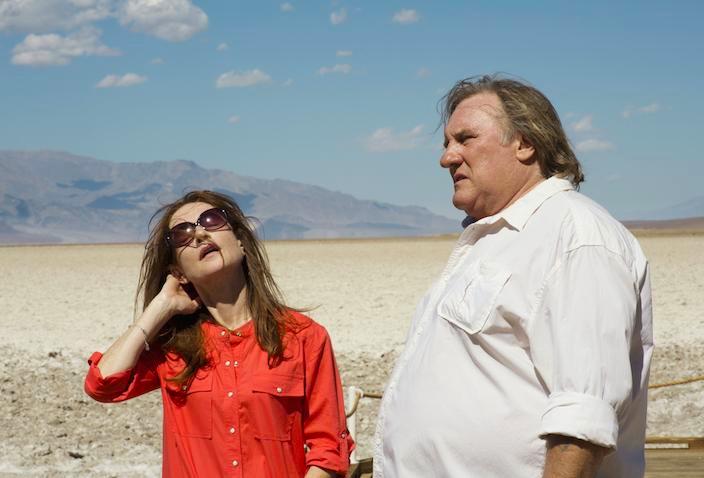 There are a few contenders out there for the biggest French star in the world. Vincent Cassel and Mathieu Amalric have enduring international appeal, Juliette Binoche is an auteurist favorite, and a new generation of actors like Jean Dujardin, Lea Seydoux, and Omar Sy are increasingly having as much success in the U.S. as they are at home. But if we’re talking about cinematic legends — truly prolific, popular actors — the safest bets might be Isabelle Huppert and Gérard Depardieu. Across decades-long careers, the two actors have earned enormous acclaim, won virtually every prize available, and had every A-list director around the world lining up to work with them. They’ve only worked together twice, however, in 1974’s "Going Places" and 1980’s "Loulou," which makes their reunion 30 years on in Cannes competition entry "Valley Of Love" a major event.
There are a few contenders out there for the biggest French star in the world. Vincent Cassel and Mathieu Amalric have enduring international appeal, Juliette Binoche is an auteurist favorite, and a new generation of actors like Jean Dujardin, Lea Seydoux, and Omar Sy are increasingly having as much success in the U.S. as they are at home. But if we’re talking about cinematic legends — truly prolific, popular actors — the safest bets might be Isabelle Huppert and Gérard Depardieu. Across decades-long careers, the two actors have earned enormous acclaim, won virtually every prize available, and had every A-list director around the world lining up to work with them. They’ve only worked together twice, however, in 1974’s "Going Places" and 1980’s "Loulou," which makes their reunion 30 years on in Cannes competition entry "Valley Of Love" a major event.
In the latest from director Guillaume Nicloux ("The Kidnapping Of Michel Houllebecq"), the pair play Isabelle and Gérard, a pair of internationally renowned actors who reunite in a hotel in California’s Death Valley. Many years ago they were married, but have long been divorced: Isabelle is remarried with young children, Gérard appears to have kept up a life of womanizing (in real life, there’s no suggestion that the pair were actually ever in a relationship; in fact, Depardieu’s role was originally written for "Love Story" star Ryan O’Neal). They’ve been drawn back together after each receiving a letter from their son, who was estranged from them both (Isabelle had not seen him in seven years), and who killed himself in San Francisco six months earlier. The letters tell them that if they both come to Death Valley, and turn up at seven appointed landmarks across seven days at exactly 2 PM, that they will see him again. They’re understandably skeptical, and nearly didn’t come, but they’re here, curious about their son’s motives.

The idea of Depardieu and Huppert sharing the screen together, especially in such an unlikely location (which is beautifully captured on screen, appearing both picturesque and terrifying), is an enticing one, and on that front, "Valley Of Love" delivers. It might sound distracting to have the two actors playing versions of themselves — something that doesn’t actually become apparent until about a third of the way in — but Nicloux makes the right decision to use it as a shorthand, rather than sinking the film with meta-jokes and references. This gives the pair room to draw on their own personas and shared histories together. "I got fat," Depardieu shamefacedly says, and indeed he has since he last worked with Huppert, something the film takes every opportunity to remind you of, with the actor walking around sweaty and topless for about half the running time. It’s that past, and of course their innate skills, which allow these two to deliver absolutely terrific turns. Huppert is flinty and guilt-stricken, desperate for answers, while Depardieu embraces his mortality in a rather sweet, low-key turn.
If you’re going to bring them together, though, it’s a shame to give them material as empty and hollow as this. Initially starting as a sort of culture-clash comedy, the film becomes more of a examination of grief, but Nicloux throws in soapy developments (cancer! divorces!) that shift the focus away from their loss, and their complacency in their child’s death, and towards his rather unsympathetic protagonists. Then, at the midpoint, it changes again, into a sort of supernatural drama, suggesting that maybe their son wasn’t having them on when he suggested he’d actually come back.
A film as mercurial as this can be an impressive thing, but the back half is so filled with half-baked metaphysics, pseudo-Lynchian maybe-dreams, and a sour, cheap conclusion that feels nihilistically cruel to at least one of its characters, that even the pleasures of watching the actors on screen start to fade away. Indeed, much of what they’re given to say is so banal that you start to suspect that just letting the stars improvise would have led to a more satisfying film.

The result is something that skirts around big ideas without actually engaging with them, that sets up some interesting conflicts but never pulls the trigger, and that doesn’t even really take advantage of its backdrops, with the Death Valley setting ultimately feeling arbitrary. Depardieu and Huppert’s presence might have got this into competition at Cannes, but if this had started Melissa Leo and Oliver Platt (no disrespect to those two terrific actors), this script would have been lucky to get into Tribeca. [C-]
Check out all our coverage from the 2015 Cannes Film Festival by clicking here.

